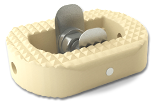Welcome to https://eurospine.com/
The purpose of this privacy policy is to formalise our commitment to respecting the privacy of users of the https://eurospine.com/ website operated by Eurospine SARL (“EUROSPINE”).
As part of the provision of our Site, we process your personal data in compliance with the General Data Protection Regulation 2016/679 of 27 April 2016 (“GDPR”) and under the conditions set out below.
Personal data means any information relating to an identified or identifiable natural person. We collect and process personal data in the course of providing our Services or communicating about those Services exclusively, in strict compliance with the GDPR.
We only collect personal data that is adequate, relevant and limited to what is necessary for the purposes for which it is processed. You will therefore never be asked to provide personal data considered to be “sensitive”, such as your racial or ethnic origins or your political, philosophical or religious opinions.
By registering on the Site, you authorise us to process your personal data in accordance with the Privacy Policy. If you do not agree to the terms of this policy, please refrain from using it.
1. Data controller and basis for processing
EUROSPINE, a limited liability company, registered in the Paris Trade and Companies Register under no. 419 399 738 and whose registered office is located at 3 avenue des Dahlias 94240 L’hay-les-roses, is responsible for processing the data collected on the Site.
There are several bases for processing on the Eurospine site. Public interest processing in order to meet the requirements of Regulation 2017/745 in order to give certain legitimate users access to Eurospine’s electronic documentation.
Legitimate interest of Eurospine to respond to commercial solicitations via the contact form.
2. When do we collect your personal data and what data is collected?
2.1. When do we collect your personal data?
We may collect and store the personal data you send us, in particular when you:
– send such information to our customer service department by email or telephone;
– wish to access EUROSPINE electronic documentation.
You can always choose not to send us this information. However, in certain cases it is essential for the proper performance of a Service.
We use your personal data to implement and manage the Site Services and to respond to your specific requests. We also use your personal data to operate and improve our Services, our Site and our approach. This information is used solely by us and enables us to better tailor our Services to your expectations.
2.2 What personal data is collected?
2.2.1 Contact form
To contact Eurospine, you will be asked to fill in a contact form. You will be asked to provide a certain amount of personal data when filling out this contact form, in particular your first and last names, e-mail address and job title.
2.2.2 Access to electronic documentation
To access EUROSPINE’s electronic documentation your date and place of birth, you will be asked to provide a certain amount of personal data when filling in the access form, in particular your first and last names and your e-mail address.
3. How do we protect your personal data?
We have implemented technical and organisational security measures to guarantee the security, integrity and confidentiality of all your personal data, in order to prevent it from being distorted, damaged or accessed by unauthorised third parties. We ensure an appropriate level of security, taking into account the state of the art, the costs of implementation and the nature, scope, context and purposes of the processing as well as the risks and their likelihood.
However, it is specified that as no security measure is infallible, EUROSPINE is not in a position to guarantee absolute security for your personal data.
Furthermore, it is your responsibility to ensure the confidentiality of the password enabling you to access your Account. Do not share this information with anyone. If you share your computer, remember to disconnect before leaving the Site.
4. When do we share your personal data?
4.1 Sharing your personal data with third-party companies
When you browse the Site, your personal data may be transmitted to external service providers. These third parties provide a service for us and on our behalf in order to ensure the smooth operation of our site, and in particular to guarantee the smooth operation of the contact form and to ensure effective access to electronic documentation.
In accordance with the GDPR, all transfers of personal data to a country outside the European Union and/or which does not offer a level of protection considered sufficient by the European Commission have been subject to cross-border data flow agreements that comply with the standard contractual clauses issued by the European Commission and declared to the CNIL. Except in the case where a third party asks you to accept a confidentiality policy and conditions of use that are specific to that third party, the third-party companies that have received your personal data have undertaken to process your personal data solely for the purpose of providing the Services.
We will never, without your prior consent, share your personal data with third-party companies for marketing and/or commercial purposes.
4.2 Sharing with the authorities
We may disclose your personal data to administrative or judicial authorities where disclosure is necessary for the identification, arrest or prosecution of any individual who may be prejudicial to our rights, any other user or any third party. Finally, we may be legally obliged to disclose your personal data and in this case we cannot object.
5. How long do we keep your personal data?
We will only keep your personal data for as long as it takes to complete the contact form on the Site, in order to identify you when you request contact and to enable us to provide the Services.
In any event, we will keep your personal data for no longer than is necessary for the purposes for which it is processed in accordance with the uses set out in this privacy policy and in compliance with the laws and regulations.
6. Cookies: how do we use them?
6.1 What is a cookie?
A cookie is a text file that may be stored on a terminal when an online service is consulted using a browser. During its period of validity, a cookie file enables its issuer to recognise the terminal concerned each time this terminal accesses digital content containing cookies from the same issuer.
In any event, cookies placed on your browser terminal with your consent are destroyed 13 months after they are placed on your terminal.
6.2 What are the cookies used for on our Site?
The cookies we use enable us to:
– compile statistics and volumes of visits to and use of the various elements making up our Site (sections and content visited, path taken), enabling us to improve the interest and ergonomics of our services;
– to adapt the presentation of our Site to the display preferences of your terminal (language used, display resolution, operating system used, etc.) during your visits to our Site, depending on the hardware and viewing or reading software that your terminal has;
– to enable you to access reserved and personal areas of our Site, such as access to electronic documentation.
During your browsing on the Site, cookies from social networks may be generated, in particular via the sharing buttons, which collect personal data.
When you first visit the Site, a cookies banner will appear on the home page. A clickable link allows you to find out more about the purpose and operation of cookies and refers you to this Confidentiality Policy. By continuing to browse on another page of the Site or selecting an element of the Site (in particular: image, text, link, etc.), you agree to the deposit of the cookies in question on your computer.
6.3 How can you control the cookies used?
We use a cookie management tool that allows you to view and deactivate the use of cookies.
You can also configure your browser software so that cookies are stored on your terminal or, conversely, so that they are rejected (either systematically or depending on the sender). You can also configure your browser software so that you are asked to accept or reject cookies from time to time, before a cookie is stored on your terminal.
Please note: any settings you make may affect your Internet browsing experience and your conditions of access to certain services requiring the use of cookies. We decline all responsibility for the consequences linked to the degraded operation of our services resulting from the impossibility of recording or consulting the cookies necessary for their operation and which you would have refused or deleted. This would be the case if you attempted to access our content or services that require you to be identified, such as the contact form or access to electronic documentation. This would also be the case if we (or our service providers) were unable to recognise, for technical compatibility purposes, the type of browser used by your terminal, its language and display settings or the country from which your terminal is being used.
6.4 How do you configure your browser?
To manage cookies and your choices, the configuration of each browser is different. This is described in your browser’s help menu, which will tell you how to modify your cookie preferences. Below you will find information about the main browsers.
Internet Explorer / Edge
In Internet Explorer, click on the Tools button, then on Internet Options.
On the General tab, under Browsing History, click on Settings.
Click on the View Files button.
Firefox
Go to the browser’s Tools tab, then select the Options menu
In the window that appears, choose Privacy and click on Show cookies.
Safari
Go to Settings via the browser menu (Safari > Preferences).
Click on Privacy.
Google Chrome
Go to Settings via the button to the right of the URL bar or via the browser menu (Chrome > Preferences).
Select Advanced Settings.
Click on Content Settings and then on Cookies.
For more information on cookies, please consult the CNIL website.
7. What are your rights?
You are the only person to have communicated the data in our possession via the Site. You have rights to your personal data. In accordance with the regulations on the protection of personal data, in particular articles 15 to 22 of the RGPD, and after proving your identity, you have the right to ask us to access, rectify or delete your personal data.
In addition, within the limits laid down by law, you also have the right to object to the processing, to limit it, to decide what happens to your data, to withdraw your consent at any time and the right to portability of the personal data provided.
You can contact our Services to exercise your rights at the following e-mail address: contact@eurospine.com
8. Can we change the Privacy Policy?
We reserve the right to modify the Confidentiality Policy at any time. You are therefore advised to consult it regularly. If we make any changes, we will post those changes on this page and in such other places as we deem appropriate in light of the purpose and significance of the changes.
Your use of the Site after any changes means that you accept those changes. If you do not agree to any material changes made herein, you must stop using the Site.
9. Contact
If you have any questions about your personal data, please contact us at the following address: EUROSPINE, Société à responsabilité limitée, located at 3 avenue des Dahlias 94240 L’hay-les-roses or by email at contact@eurospine.com.
10. The French Data Protection Authority (“CNIL”)
Eurospine reminds you that you can contact the CNIL directly on the CNIL website or by post at the following address: Commission Nationale de l’Informatique et des Libertés (CNIL), 3 Place de Fontenoy – TSA 80715, 75334 PARIS CEDEX 07.

